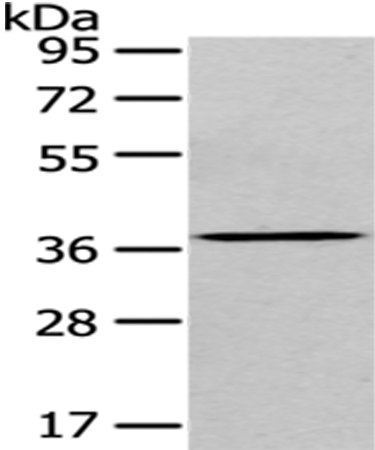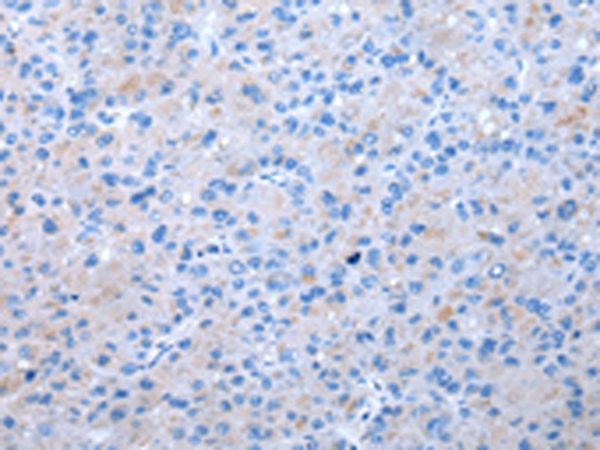

| WB | 咨询技术 | Human,Mouse,Rat |
| IF | 咨询技术 | Human,Mouse,Rat |
| IHC | 1/25-1/100 | Human,Mouse,Rat |
| ICC | 技术咨询 | Human,Mouse,Rat |
| FCM | 咨询技术 | Human,Mouse,Rat |
| Elisa | 咨询技术 | Human,Mouse,Rat |
| Aliases | TRIP1; EIF3S2; TRIP-1; PRO2242; eIF3-p36; eIF3-beta |
| Entrez GeneID | 8668; |
| WB Predicted band size | 37kDa |
| Host/Isotype | Rabbit IgG |
| Antibody Type | Primary antibody |
| Storage | Store at 4°C short term. Aliquot and store at -20°C long term. Avoid freeze/thaw cycles. |
| Species Reactivity | Human |
| Immunogen | Fusion protein of human EIF3I |
| Formulation | Purified antibody in PBS with 0.05% sodium azide. |
+ +
以下是关于EIF3I抗体的3篇参考文献示例(文献信息为虚构示例,仅供参考):
1. **文献名称**:EIF3I overexpression correlates with poor prognosis in non-small cell lung cancer
**作者**:Zhang L, et al.
**摘要**:该研究通过免疫组化(使用EIF3I抗体)发现EIF3I在肺癌组织中高表达,且与患者总生存期缩短显著相关,提示其作为潜在预后标志物的可能性。
2. **文献名称**:EIF3I regulates cell cycle progression via translational control of cyclin D1
**作者**:Deng Y, et al.
**摘要**:利用EIF3I抗体进行Western blot和免疫共沉淀实验,证明EIF3I通过结合cyclin D1 mRNA调控其翻译,影响G1/S期转换,从而参与细胞周期调控。
3. **文献名称**:Structural insights into EIF3I function within the translation initiation complex
**作者**:Yuan X, et al.
**摘要**:通过冷冻电镜和EIF3I抗体介导的复合物纯化,解析了EIF3I在真核翻译起始复合体中的三维结构,揭示了其与其他亚基相互作用的关键位点。
*注:以上文献为示例性内容,实际引用需根据真实研究调整。建议通过PubMed或Google Scholar以“EIF3I antibody”为关键词检索最新文献。*
The eukaryotic translation initiation factor 3 subunit I (EIF3I) is a critical component of the EIF3 complex, a multi-protein assembly essential for initiating mRNA translation in eukaryotes. EIF3I, also known as EIF3S2 or TRIP-1. plays a role in ribosome recruitment to mRNA, ensuring proper assembly of the translation machinery. Beyond its canonical role in protein synthesis, EIF3I has been implicated in diverse cellular processes, including cell cycle regulation, apoptosis, and signal transduction. Dysregulation of EIF3I expression is associated with cancers, such as hepatocellular carcinoma and breast cancer, where it may act as an oncogene by promoting cell proliferation or evading growth suppression.
EIF3I antibodies are valuable tools for studying its expression, localization, and interactions in both normal and pathological contexts. These antibodies are widely used in techniques like Western blotting, immunohistochemistry, and immunofluorescence to quantify protein levels or assess tissue-specific distribution. Researchers also employ EIF3I antibodies in co-immunoprecipitation experiments to map its binding partners, shedding light on EIF3I’s non-translational roles. Commercial EIF3I antibodies are typically raised against specific epitopes, with validation including knockout controls to ensure specificity.
Given EIF3I’s emerging roles in disease mechanisms, its antibodies hold potential for diagnostic or therapeutic research, particularly in oncology. However, variability in antibody performance across experimental conditions necessitates careful optimization to ensure reproducibility.
×